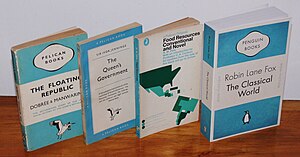Pelican Books

Four Pelican book covers, showing the gradual shift in the design. From left – 1937 (three bands), 1955 (grid), 1969 (illustrated), and 2007 (a "Penguin Celebrations" throwback edition)
|
|
| Parent company | Penguin Random House |
|---|---|
| Founded | 1937 |
| Founder | Allen Lane |
| Country of origin | United Kingdom |
| Headquarters location | London |
| Publication types | Books |
| Official website | www |
Pelican Books is a non-fiction imprint of Penguin Books. Founded in 1937, Pelican Books combined important topics with clear prose to create inexpensive paperbacks for a broad audience. Before being discontinued in 1984, Pelican Books published thousands of accessible, stimulating books covering a wide range of subjects from classical music to molecular biology to architecture. The imprint was relaunched in April 2014, with the first five titles appearing in May.
Pelican Books was established in 1937 as a non-fiction imprint for low-cost intellectual paperbacks. Founder Allen Lane wrote, ‘We… believed in the existence in this country of a vast reading public for intelligent books at a low price, and staked everything on it.’ Pelican lowered the traditional barriers to knowledge by selling books at the cost of a packet of cigarettes. These books became especially popular among the self-educating post-war generation, and Pelican was even called an ‘informal university for '50s Britons’ by The Guardian.The Spectator reported, ‘If there is any sense in saying that the culture of the world should be accessible to all without distinctions of wealth, such publications are helping to make it true.’
Pelican published many of the major intellects of the 20th century including historian Eric Hobsbawm, literary critic Boris Ford, philosopher AJ Ayer, and scientist Jacob Bronowski. Pelican’s first book was George Bernard Shaw’s The Intelligent Woman's Guide to Socialism and Capitalism. Other classic Pelican books included Totem and Taboo, The Eighteen Nineties, An Introduction to Modern Architecture, Coming of Age in Samoa, The Pelican Guide to English Literature, and Childhood in Society. Pelican’s early supporters included George Orwell, H. G. Wells, George Bernard Shaw, and J. B. Priestley.
...
Wikipedia
